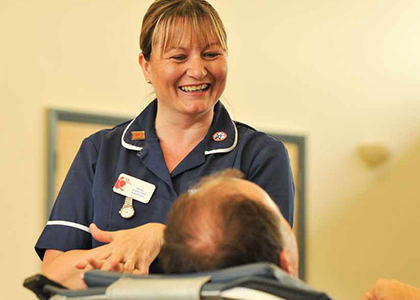When giving blood is just what the doctor orders!
People with a common genetic condition can donate blood as part of their treatment
Genetic haemochromatosis (GH) is one of the most common genetic disorders, affecting around 1 in 200 people in the UK. It causes iron levels to build up in the blood over time, which can damage organs and joints in the body if left untreated.
The main and conventional treatment for GH is phlebotomy - taking blood. GH patients can undergo this procedure as often as once a week during the ‘depletion’ phase – when their iron levels are particularly high. Once levels have fallen, the patient enters a ‘maintenance’ phase and may only require phlebotomy 4 or 5 times a year.
The blood that’s taken is usually thrown away. But we are working with the Haemochromatosis Society to encourage those that are affected with the condition to become regular blood donors. A win-win arrangement!
Giving blood for better health
 Despite its higher iron levels, GH patients’ blood is completely safe to transfuse. People with GH are able to give blood for transfusion providing they meet all of the donor selection criteria, are well with no tissue damage (due to iron overload) and are not taking any medication for their condition.
Despite its higher iron levels, GH patients’ blood is completely safe to transfuse. People with GH are able to give blood for transfusion providing they meet all of the donor selection criteria, are well with no tissue damage (due to iron overload) and are not taking any medication for their condition.
GH donors can only donate once they have completed the intensive ‘depletion’ phase, and are in the ‘maintenance’ phase.
Until now, accepting a new GH donor has been a long process that has relied heavily on clinical support and work with the donor's hospital specialist.
However, we are now working with large specialist clinics to recruit GH donors to our donor centres, where we can better handle their more frequent donations.
“It’s so much easier to manage”
Adrian Gill from Huddersfield was diagnosed with GH when he was 33, and in 2013 he started donating blood to manage his condition.
He says, “I went to my GP because I was feeling run down, lethargic and was suffering from anxiety. Blood tests revealed that I had genetic haemochromatosis, and initially I attended the haematology outpatients at my local hospital for phlebotomy treatment.
“It seemed wasteful that my blood was simply being thrown away, so I enquired about donating my blood. Not only can my blood be put to good use, but I find donating it much easier too. With the hospital appointments, I was restricted to weekdays in work hours. Now, I can pick and choose dates and times, and book as many appointments as I can in advance.
“Because of my condition, I can donate every six weeks and this allows me to manage my iron levels well.”
In this issue of The Donor magazine
- Improving your experience of donating
- Christmas messages
- Why we need more black blood donors
- Winter news
- Donors could give blood more often
- New steps towards lab-produced platelets
- Let them see what they can only imagine
- Getting on like a house on fire with the fire service
- John donates in style
- Public inquiry into blood safety
- What happens when you give blood
- I just saved my neighbour's life
